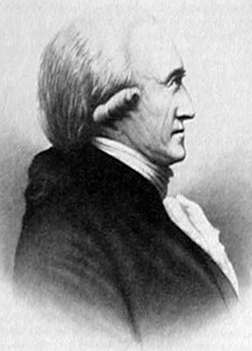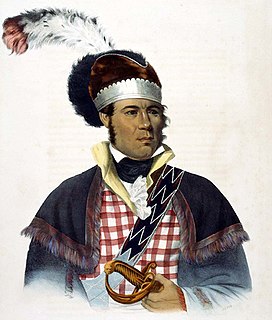The Treaty of the Creek Agency was signed on January 22, 1818, at the Creek Agency on the Flint River in Georgia. The treaty was handled for the U.S. by former Governor of Georgia David Brydie Mitchell who was serving as President James Monroe's agent of Indian affairs for the Creek nation. The terms of the treaty ceded two tracts of land to the United States in exchange for $120,000 paid to the Creeks over the course of 11 years.
The Creek Agency was an organ of the U.S. Government authorized to interact and negotiate with the Muscogee Indians of Georgia and the Mississippi Territory. It was set up in 1796 on the Flint River in what is today Crawford County, Georgia by Indian Agent Col. Benjamin Hawkins. He established there a trading post and a plantation. Hawkins, regarded both at the time and now as relatively successful in his interactions with the Creeks, died in 1816. He was succeeded by David B. Mitchell (1817–1821), formerly Governor of Georgia. His tenure was much less successful. The Treaty of the Creek Agency (1818) was signed there. It is not known whether his successor, John Crowell, resided at the Creek Agency.

The Flint River is a 344-mile-long (554 km) river in the U.S. state of Georgia. The river drains 8,460 square miles (21,900 km2) of western Georgia, flowing south from the upper Piedmont region south of Atlanta to the wetlands of the Gulf Coastal Plain in the southwestern corner of the state. Along with the Apalachicola and the Chattahoochee rivers, it forms part of the ACF basin. In its upper course through the red hills of the Piedmont, it is considered especially scenic, flowing unimpeded for over 200 miles (320 km). Historically, it was also called the Thronateeska River.

Georgia is a state in the Southeastern United States. It began as a British colony in 1733, the last and southernmost of the original Thirteen Colonies to be established. Named after King George II of Great Britain, the Province of Georgia covered the area from South Carolina south to Spanish Florida and west to French Louisiana at the Mississippi River. Georgia was the fourth state to ratify the United States Constitution, on January 2, 1788. In 1802–1804, western Georgia was split to the Mississippi Territory, which later split to form Alabama with part of former West Florida in 1819. Georgia declared its secession from the Union on January 19, 1861, and was one of the original seven Confederate states. It was the last state to be restored to the Union, on July 15, 1870. Georgia is the 24th largest and the 8th most populous of the 50 United States. From 2007 to 2008, 14 of Georgia's counties ranked among the nation's 100 fastest-growing, second only to Texas. Georgia is known as the Peach State and the Empire State of the South. Atlanta, the state's capital and most populous city, has been named a global city. Atlanta's metropolitan area contains about 55% of the population of the entire state.











